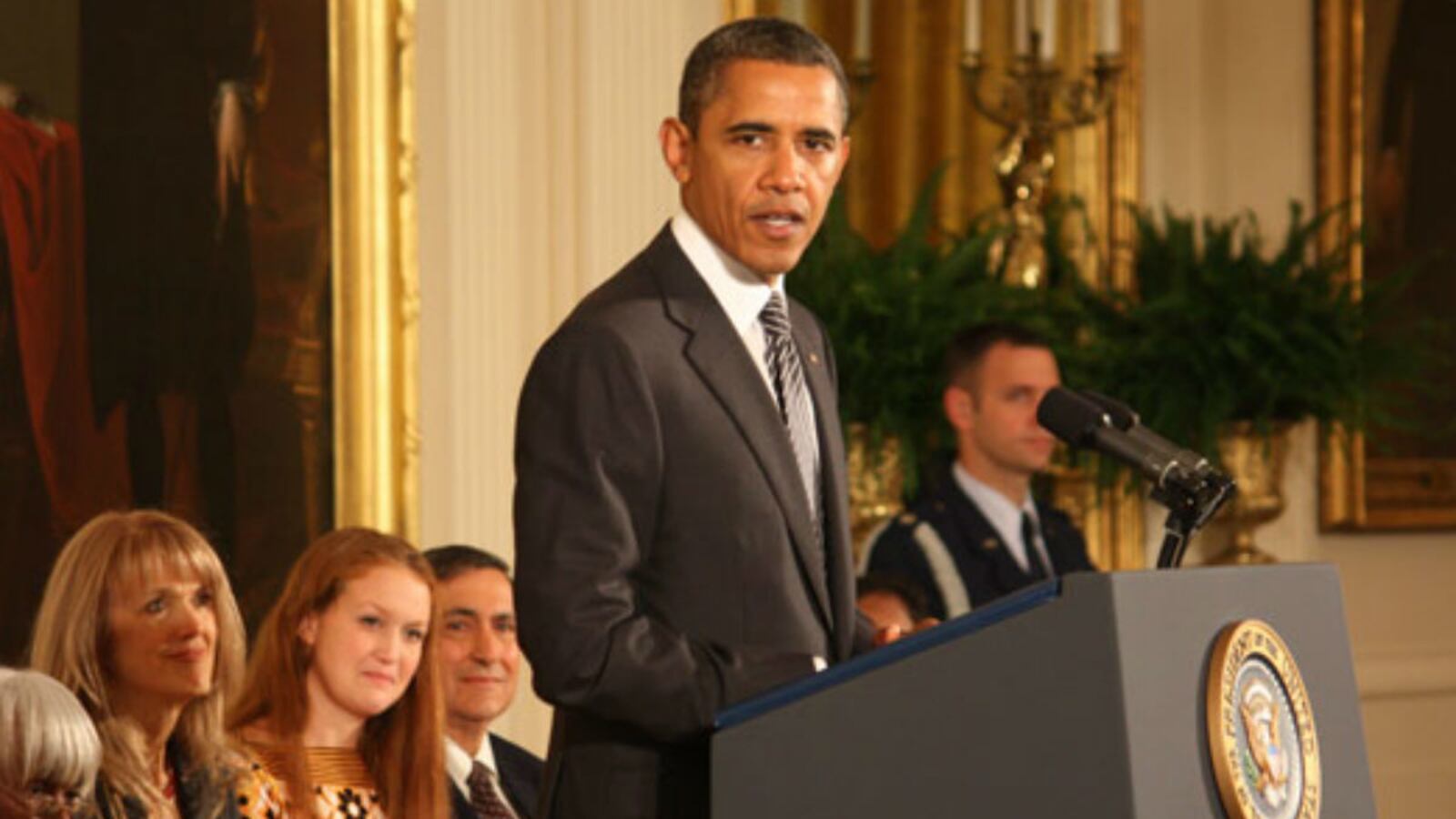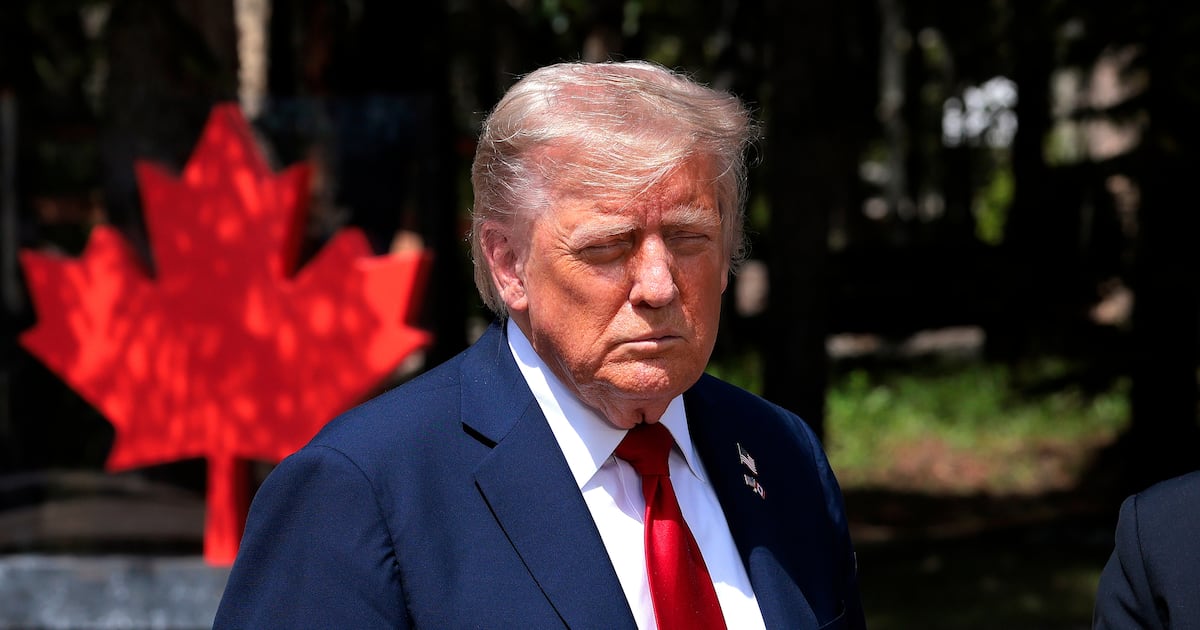President Obama just slapped in the face one of America's closest allies in Europe. I'm looking for comment in the American media, and I find … wire stories reporting a spokesman's apology for the president's "misstatement"?
The president intended to honor Jan Karski, a Polish-born U.S. citizen, who died in 2000. Karski was a hero of the Polish resistance, the courier who brought to the outside world the irrefutable proof of the Nazi extermination campaign against the Jews of Eastern Europe. But instead of honoring Karski, the president stumbled into the single most offensive thing he could possibly have said on this occasion:
Before one trip across enemy lines, resistance fighters told him that Jews were being murdered on a massive scale, and smuggled him into the Warsaw Ghetto and a Polish death camp to see for himself.
Many of the Nazi death camps were located inside the territory that is now Poland, yes. But it was not Poland in 1942. Poland then was a conquered and enslaved territory. If we are to identify the killers by nationality—rather than by their Nazi ideology as would be most appropriate—then the camps were German, German, German: ordered into being by Germans, designed by Germans, fulfilling a German plan of murder. When they found local thugs to guard the victims and run the killing machinery, even those low-level wretches were very rarely Polish by language or self-conception: they were more typically Ukrainian, because many Ukrainians—with their own sufferings at the hands of Josef Stalin's Soviet regime fresh in mind—were willing to act as German allies in a war that was advertised as a war against the Bolshevism that had starved their fathers, mothers, and children to death in the early 1930s. But Poles? As a Polish friend of mine once bitterly put it, "The Germans despised us so much, they did not even want us as collaborators."
When one writes this way, one hears much about the Polish history of anti-semitism. Polish anti-semitism is of course a very real thing. But boycotts, insults, and street-fights are not genocide. And alongside Polish anti-semitism has to be set the other history, the history that explains why Jews migrated to Poland in such huge numbers during the Middle Ages, and stayed there for so long. When my own grandfather emigrated from Poland to Canada in 1929, he was leaving a land where his ancestors had likely lived for at least 400 years, and very possibly 600.
There's a tragic bias in the Jewish remembrance of Poland. The Jews who suffered discrimination and poverty in the newly independent Poland of the 1920s, and who—like my grandfather—succeeded in emigrating have left descendants. We carry in our memories their stories of discrimination and harassment. But the much larger number of Jews who found conditions tolerable—the many who flourished in business, the professions, and the arts—the many who regarded Poland as their home and carried arms for her in war—those Jews stayed. They were murdered. And they left no descendants to remember their version of the story.
Few organizations have been more vocal against the "Polish death camp" slur than the Anti-Defamation League. Its president, Abe Foxman, was born in what was then Poland. His story exemplifies the complexities of the Polish-Jewish relationship. When Foxman's parents were deported to a ghetto, they entrusted him to his nanny. She raised him—not only saving his life, but risking her own, for the Nazis killed Poles who sheltered Jews. But she interpreted "raising" to mean raising him as a Catholic, and after the war—which Foxman's parents amazingly survived—she refused to give him up until after some nasty custody battles. (By then, the border had shifted, which is why many biographies of Foxman describe him as born in the Soviet Union.)

What North American Jews who originate in Poland need to learn from Foxman and those who have stories like his to tell is that Poland was not only a place where Jews were murdered, but also a place where Jews lived—and at every level of society. The Foxmans had a nanny! Other Polish Jews owned factories, shops, and country houses. There were Jewish chaplains in the Polish Army. (The head chaplain was murdered by the Soviets in the Katyn Forest, alongside his brother officers.) That story needs to be rediscovered too, and since 1989, it has been.
I took my family on a long visit to Poland two summers ago. And yes, we toured the camps. We also stayed in a beautiful hotel in the historic center of Krakow, whose lobby was filled every day with the sounds of Hebrew: visitors from Israel who had come not only to see the sites of Auschwitz and Belzec, but also to see the Schindler museum in Oskar Schindler's one-time factory, the preserved Jewish quarter, and the rebuilt grand synagogue. The state of Israel has had few better allies in Europe than democratic Poland. That's part of the story too.
The honor to Jan Karski was intended to memorialize all this. Instead, an ignorant error by somebody who could not be troubled to understand the story he or she was telling has offended Poles and thrown discredit on Karski's own memory. It's not a big story in the United States, but it won't soon be forgotten in Poland.
You may say the Poles are over-sensitive. One might as well say that Americans are under-sensitive. The U.S. has had such a comparatively happy history that it's hard to think of a domestic analogy that would capture what Poles feel when the worst crimes of their worst oppressors are attributed—not to the authors—but to them. "The Hawaiian sneak attack on the U.S. naval base at Pearl Harbor" is a pathetically inadequate approximation, but at least it gets the grammar of the insult. "The Belgian massacre of U.S. prisoners at Malmedy"? No, still not it. Aside from being morally inadequate, such analogies also miss the moral intensity of World War II for Poles. Their war did not end until 1989: they continue to live more intimately with the war's legacy even now, more than almost any other European nation. The medal to Karski was to be part of the process of laying painful memories to rest. It was intended too to strengthen the US-Polish relations that the Obama administration has frayed in pursuit of its "reset" with Russia. Instead, this administration bungled everything: past, present, and future.
Shame.






